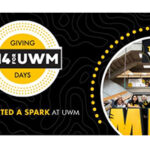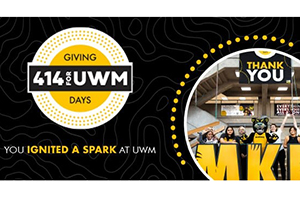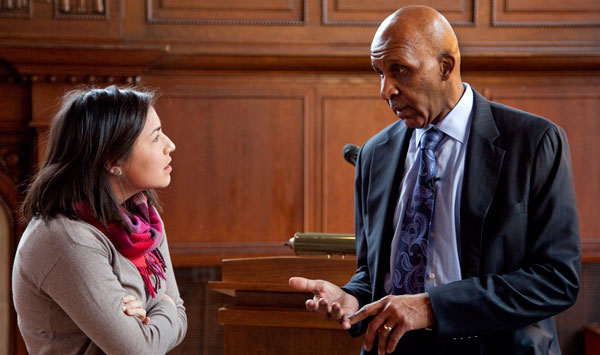
One of the key lessons he learned at the University of Wisconsin-Milwaukee was to have confidence in himself and his decisions, says Milton Coleman (’68 BFA Music).
Coleman, now senior editor of The Washington Post, credits his education at UWM with laying the foundation for his long and successful professional career.
“What I learned here prepared me to compete with the best in the world,” Coleman said, as he accepted an award as the first UWM Foundation Alumni Fellow on Feb. 21.
IN THIS VIDEO: Coleman talks about how a $128 scholarship led him to UWM and changed his life. View full size on YouTube
Alumni Fellow is a lifelong designation that recognizes prominent and outstanding alumni who demonstrate leadership and accomplishment in their professional fields and personal lives. The new Alumni Fellow Program brings honorees back to campus to share their knowledge, insight and stories with students, faculty, staff and members of the community.
Coleman received his bachelor’s degree in music history and literature from UWM, moved into journalism starting at the Milwaukee Courier and joined The Post in 1976.
Over the years he rose from reporter on the metropolitan staff to his current position.
Among his many professional awards and honors, Coleman has served as a jury chairman for the Pulitzer Prizes in Journalism and as a judge for a number of other top journalism awards.
He is president of the Inter American Press Association and immediate past president of the American Society of News Editors. Through his work with those organizations, he has taken part in fact-finding missions and given presentations on press freedom and media ethics in many Caribbean and Latin American countries.
Coleman learned Spanish to provide newsroom guidance to El Tiempo Latino, a Spanish-language weekly owned by The Post. “You have to keep reinventing yourself,” he told student journalists he spoke to.
It started with a scholarship
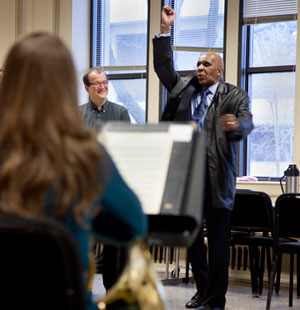
But it all started with a scholarship from UWM that helped Coleman, who grew up in the Hillside Terrace public housing project in Milwaukee, become the first in his family to graduate from college.
“Absent that $128 scholarship, I don’t know where I’d be,” he said at the ceremony where he accepted the Alumni Fellow award. That scholarship for one semester’s tuition, coupled with work-study and weekend music gigs at $15 apiece, helped him earn his degree.
During his two-day visit to UWM in mid-February as part of the fellowship, Coleman visited music and journalism classes, answering questions and sharing his insights. He also was part of a panel on education at the Milwaukee Press Club.
Although music eventually became a means to an end, helping him earn his way through school, the lessons he learned about how to think, how to listen, how learn from others and not be afraid to make mistakes were critical to his future success, he told music students.
The past, present and future of news
In journalism class, he discussed the changing nature of news and shared some of his experiences – good and bad – in the field.
Newspapers like The Post are changing dramatically into multimedia organizations, he told the students, because they are no longer the main source of information for most readers.
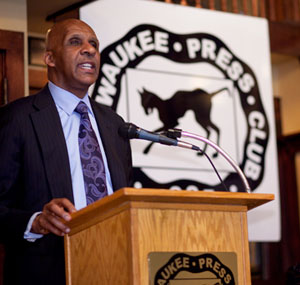
“My first exposure to news in the morning is on my iPhone.” Only after that, he says, does he go downstairs and read the newspaper. “Newspapers don’t dictate when I get the news.”
The multiple ways people can share and access information offer new opportunities for journalists, he told the students, though they have led to fragmentation or “atomization” of audiences into groups united around specific interests. “You don’t have to own a printing press and a distribution channel” to practice journalism he told one student in answer to a question about job opportunities.
In spite of the numerous sources and outlets for news, the public is still challenged to find accurate information, Coleman said, and the need for good journalists is more vital than ever.
“Democracy has to be well-informed. The demand for accurate reporting continues,” he said, adding that with multimedia, “we are telling stories better than we used to.” The Post’s newsroom, for example, now incorporates a television studio and a Web operation along with writers and photographers.
Sharing lessons
Coleman also shared lessons with the students about learning from mistakes, candidly talking about an editing/fact-checking mistake he made that resulted in a front-page exposé identifying the wrong man as an ex-convict.
In response to a student question, he said the highlight of his journalistic career so far was leading The Post’s coverage of Barack Obama’s inauguration, coordinating the work of 60 to 70 reporters to produce four papers, four editions and three million copies. Journalism students who talked to Coleman were impressed by his ability to understand current media while drawing on years of experience.
Ian Thompson said he appreciated hearing the perspective of an African American journalist who came out of UWM.
“It was really informative,” said Sean Willey, a broadcast journalism major. “He shared real-world experiences that you can’t learn from a textbook.”
